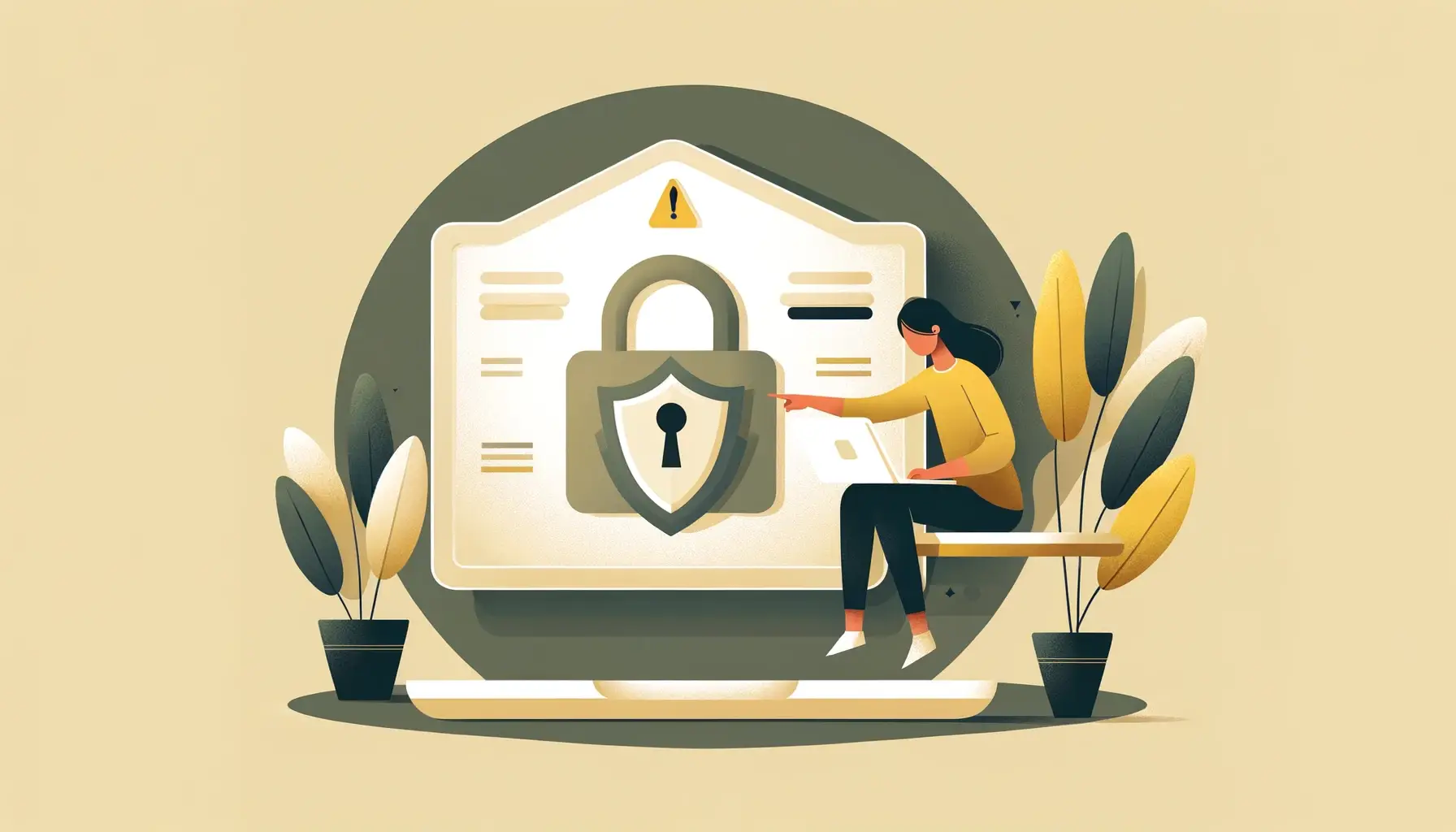
The online security of customers should be one of the main priorities for the managers of Internet companies. It may seem unusual, but some companies do not apply this philosophy to their business. When it comes to protecting their users’ data, some companies prefer Self-Signed SSL Certificates over SSL Certificates issued by a Trusted Certificate Authority.
You may ask yourself what is the difference between Self-Signed SSL Certificates and SSL Certificates issued by Trusted Certificate Authorities. Are self-signed certificates secure? We will answer that below.
Table of Contents
- What Is a Self-Signed Certificate?
- Are Self-Signed Certificates Secure?
- Why a Self-Signed Certificate Is Not Secure?
- Self-Signed Certificates Security Risks
- Disadvantages of a Self-Signed Certificate
- Are There Benefits to Using Self-Signed Certificates?
What Is a Self-Signed Certificate?
A self-signed certificate is a digital certificate issued by an entity that is not a third-party certificate authority. Any developer, website owner, or user with relevant knowledge can create a self-signed certificate for SS/TLS, Code Signing, or S/MIME purposes. Self-signed certs follow the same cryptographic protocols as any other free or commercial public certificate. However, browsers don’t trust them by default because they lack third-party verification.
Are Self-Signed Certificates Secure?
The underlying encryption technology behind self-signed SSL certificates is secure and almost impossible to decipher by hackers. What makes them vulnerable is the absence of independent verification. It’s like you’re claiming the website using them is trustworthy without anyone else to back it up.
Moreover, browsers can’t confirm the certificate’s authenticity, opening the door for malicious individuals to intercept your connection, impersonate the website, and potentially steal your sensitive information.
Why a Self-Signed Certificate Is Not Secure?
Self-signed TLS/SSL certificates serve a valuable purpose in testing environments by allowing secure communication while awaiting certificates from a public Certificate Authority (CA). However, in live production, their usage can pose significant challenges, leading to reduced website traffic and trust.
But why do many developers resort to self-signed certificates? The answer is simple: convenience and cost. The traditional process of submitting a certificate signing request (CSR), waiting for verification and signing, can be time-consuming and frustrating. To save time and streamline their workflows, developers naturally gravitate towards self-signed certificates or built-in certificate authorities (CAs).
Some organizations may be enticed by the cost-effectiveness of self-signed TLS/SSL certificates, which can be generated without any financial burden. Yet, they often fail to consider the inherent risks to trust and the maintenance complexities associated with these certificates. Particularly, the renewal process can lead to unforeseen expenses.
Ultimately, the dangers of self-signed certificates lie in the trust dimension, a fundamental pillar in today’s digital world. Organizations must ensure that all their digital certs come from a secure root of trust, are compliant with relevant policies and best practices, and are effectively managed throughout their lifecycle. Taking these precautions is crucial for maintaining robust security.
Self-Signed Certificates Security Risks
Self-signed SSL Certificates are risky because they have no validation from a third-party authority, which is usually a Trusted SSL Certificate Company. Developers and businesses try to save money by using or creating a free Self-Signed SSL Certificate. But there are several threats and possible consequences of the Self-Signed SSL certificates which you should know about.
Is your customers’ trust worth it?
Suppose your website has a Self-Signed Certificate. When a user visits your website which has a self-signed SSL Certificate, the web browser will prompt the users by showing them an alert and warning them about possible security issues on your website. Browsers do that because they do not recognize the Self-Signed Certificates as a trustworthy solution for protecting the users’ information on websites.
At this point, users will have two options: to continue browsing your website or to go and do their shopping on a safer website. Faced with a security alert, your website will most likely make a bad impression on users and will force the users to go to another website. As a company doing business online, you do not want to scare your existing users and your potential customers with such alerts. However, you are likely to do so, if you are using a Self-Signed SSL Certificate.
Brand Reputation
If you use a Self-Signed SSL Certificate, you simply cannot hide it. All web browsers will warn users about it. More than that, the web browsers’ warning is usually very graphically unappealing. It will quickly raise flags in your users’ eyes and minds. As a result, your brand may suffer irreparably.
Customers trust
The Self-Signed SSL Certificates are easy to replicate. Hackers can use this technique against your company, designing a website that looks just like yours in order to steal personal information or credit card information from your users. This can put your customers’ identities at risk.
Disadvantages of a Self-Signed Certificate
- It can cost you more than you think. In the beginning, you can save some money using a free Self-Signed SSL Certificate. However, later on, the attackers can cause enormous damage to your website, compared to the price you would pay for buying an SSL Certificate.
- It’s actually not free. When creating your own Self-Signed SSL Certificate, you will pay your developers to create it for you. Your developers’ work time doesn’t come for free, and it’s very expensive most of the time. If you are a developer yourself, you could probably earn more if you spend those hours working on your regular job, instead of trying to save some money by working on creating your own Self-Signed SSL Certificate. So, it takes both time and money to create a Self-Signed SSL Certificate. On top of that, you add the risk of attackers hacking you. The smallest mistakes in the Self-Signed SSL Certificate are backdoors for hackers to steal your customers’ personal information.
- It is difficult to monitor. If you use Self-Signed SSL Certificates, the monitoring of your active and expiring certificates becomes difficult. At SSL Dragon we monitor your SSL Certificates and notify you when your SSL Certificates are about to expire.
- It may be difficult to revoke. Self-Signed SSL Certificates are very difficult or impossible to revoke. At the same time, SSL Dragon can easily revoke an SSL Certificate, if you buy it from us.
Are There Benefits to Using Self-Signed Certificates?
Self-Signed certificates benefits will depend on the organization’s goals in utilizing them. Here are some advantages of using them in specific scenarios:
- Cost: Self-signed certificates are free to create and use. There are no costs associated with obtaining them from a third-party CA, making them an attractive option for individuals or organizations with limited budgets.
- Internal Testing and Development: Self-signed certificates can be useful for internal testing and development environments where the need for trusted certificates is not critical. They allow developers to set up secure connections without the time-consuming process of obtaining certificates from CAs.
- Encryption: Self-signed certificates provide the same advanced encryption for data transmitted between a client and a server, ensuring the information remains secure and protected from eavesdropping or tampering.
- Non-Public-Facing Services: In some cases, self-signed certificates may be suitable for services that are not publicly accessible. For example, internal APIs or systems within a closed network may not require the level of trust that comes with certificates from CAs.
- Quick Deployment: Self-signed certificates can be generated in just a few minutes, allowing rapid deployment.
Bottom Line
Surveys show that 71% of online shoppers in the US rely on the seller to protect their personal information. This means that your customers expect you to protect their personal information. If something goes wrong with your website and hackers steal your customers’ sensitive information, it’s your fault. Self-signed certificates’ security risks are too high to neglect in a live production website or environment, where trust is essential.
At SSL Dragon, we care about you and your customers, and we offer you solutions that will protect your customers and your business. You can choose from a wide range of SSL Certificates, then let us monitor your SSL Certificates and notify you about any threats and vulnerabilities that appear on the web. At the same time, we will notify you when your SSL Certificates are about to expire, and we will make sure that you and your customers are safe.
Frequently Asked Questions
The validity period of self-signed certificates is determined by the issuer, typically ranging from a few days to several years.
Copy Link
Self-signed certificates are not inherently trusted by default, as they lack third-party verification and are not recognized by browsers or operating systems as trusted authorities.
Copy Link
It’s generally okay to use self-signed certificates in non-public, internal testing or development environments where trust is not a critical concern.
Copy Link
While a self-signed certificate provides some encryption, it’s still less secure than a certificate issued by a trusted CA. However, it’s better to have a self-signed certificate than no certificate at all when encryption is needed.
Copy Link
To determine if a certificate is self-signed, check the issuer field in the certificate details. If the issuer is the same as the subject (or the issuer is not recognized by a trusted CA), it is likely a self-signed certificate.
Copy Link
Save 10% on SSL Certificates when ordering today!
Fast issuance, strong encryption, 99.99% browser trust, dedicated support, and 25-day money-back guarantee. Coupon code: SAVE10



























